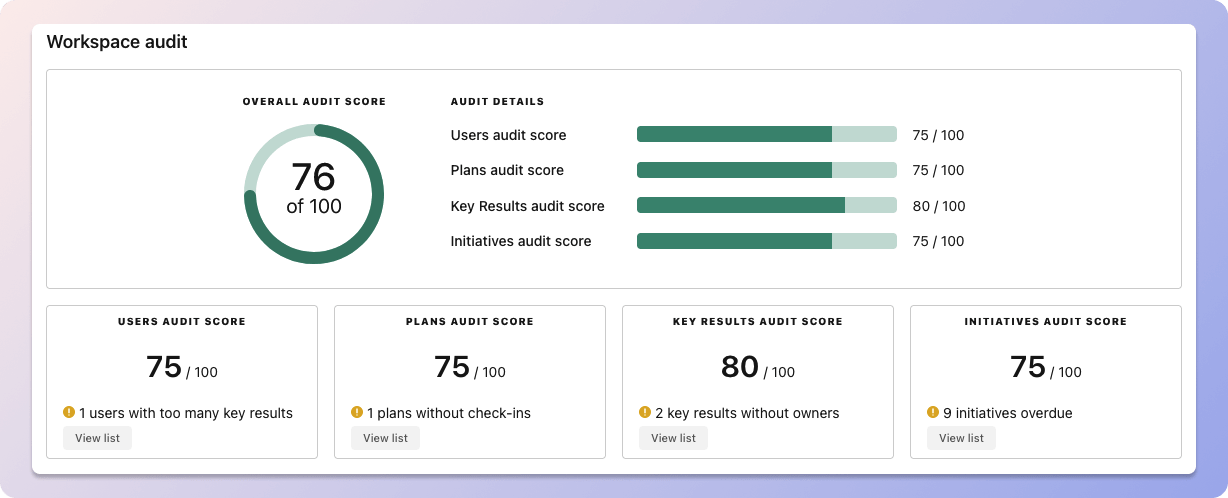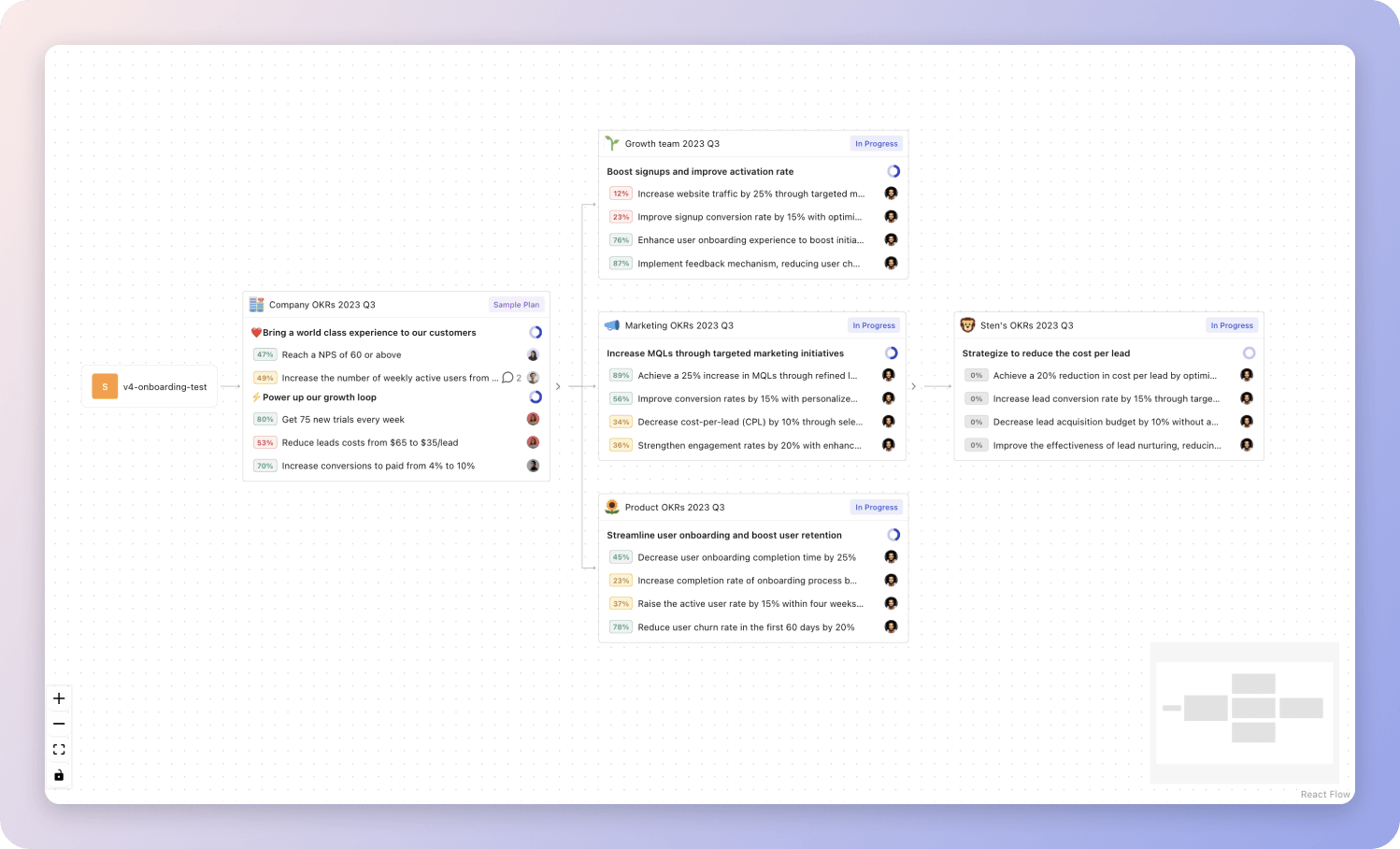7 OKR examples for Personal Development
What are Personal Development OKRs?
The Objective and Key Results (OKR) framework is a simple goal-setting methodology that was introduced at Intel by Andy Grove in the 70s. It became popular after John Doerr introduced it to Google in the 90s, and it's now used by teams of all sizes to set and track ambitious goals at scale.
Crafting effective OKRs can be challenging, particularly for beginners. Emphasizing outcomes rather than projects should be the core of your planning.
We have a collection of OKRs examples for Personal Development to give you some inspiration. You can use any of the templates below as a starting point for your OKRs.
If you want to learn more about the framework, you can read more about the OKR meaning online.
Best practices for managing your Personal Development OKRs
Generally speaking, your objectives should be ambitious yet achievable, and your key results should be measurable and time-bound (using the SMART framework can be helpful). It is also recommended to list strategic initiatives under your key results, as it'll help you avoid the common mistake of listing projects in your KRs.
Here are a couple of best practices extracted from our OKR implementation guide 👇
Tip #1: Limit the number of key results
The #1 role of OKRs is to help you and your team focus on what really matters. Business-as-usual activities will still be happening, but you do not need to track your entire roadmap in the OKRs.
We recommend having 3-4 objectives, and 3-4 key results per objective. A platform like Tability can run audits on your data to help you identify the plans that have too many goals.
 Tability's audit dashboard will highlight opportunities to improve OKRs
Tability's audit dashboard will highlight opportunities to improve OKRsTip #2: Commit to the weekly check-ins
Don't fall into the set-and-forget trap. It is important to adopt a weekly check-in process to get the full value of your OKRs and make your strategy agile – otherwise this is nothing more than a reporting exercise.
Being able to see trends for your key results will also keep yourself honest.
 Tability's check-ins will save you hours and increase transparency
Tability's check-ins will save you hours and increase transparencyTip #3: No more than 2 yellow statuses in a row
Yes, this is another tip for goal-tracking instead of goal-setting (but you'll get plenty of OKR examples below). But, once you have your goals defined, it will be your ability to keep the right sense of urgency that will make the difference.
As a rule of thumb, it's best to avoid having more than 2 yellow/at risk statuses in a row.
Make a call on the 3rd update. You should be either back on track, or off track. This sounds harsh but it's the best way to signal risks early enough to fix things.
Building your own Personal Development OKRs with AI
While we have some examples below, it's likely that you'll have specific scenarios that aren't covered here. There are 2 options available to you.
- Use our free OKRs generator
- Use Tability, a complete platform to set and track OKRs and initiatives
- including a GPT-4 powered goal generator
Best way to track your Personal Development OKRs
The rules of OKRs are simple. Quarterly OKRs should be tracked weekly, and yearly OKRs should be tracked monthly. Reviewing progress periodically has several advantages:
- It brings the goals back to the top of the mind
- It will highlight poorly set OKRs
- It will surface execution risks
- It improves transparency and accountability
We recommend using a spreadsheet for your first OKRs cycle. You'll need to get familiar with the scoring and tracking first. Then, you can scale your OKRs process by using a proper OKR-tracking tool for it.
 Tability's Strategy Map makes it easy to see all your org's OKRs
Tability's Strategy Map makes it easy to see all your org's OKRsIf you're not yet set on a tool, you can check out the 5 best OKR tracking templates guide to find the best way to monitor progress during the quarter.
Personal Development OKRs templates
We've covered most of the things that you need to know about setting good OKRs and tracking them effectively. It's now time to give you a series of templates that you can use for inspiration!
We've added many examples of Personal Development Objectives and Key Results, but we did not stop there. Understanding the difference between OKRs and projects is important, so we also added examples of strategic initiatives that relate to the OKRs.
Hope you'll find this helpful!
OKRs to improve understanding of OKRs
Improve understanding of OKRs
Read at least two books or articles about OKRs to deepen understanding
Research top books on OKRs and make a list of two to read
Set aside dedicated time every week to read and focus on OKR materials
Discuss key takeaways with colleagues or mentors to enhance comprehension
Take notes while reading to summarize main concepts and ideas
Attend a training session on OKRs to gain foundational knowledge
Attend and actively participate in the OKR training session
Prepare a notebook or document to take notes during the training session
Research online for a reputable training session on OKRs
Register for the chosen training session on OKRs
Create and successfully implement a personal OKR to apply knowledge gained
Discuss OKRs with at least three colleagues to gather different perspectives
Engage actively in conversations with colleagues to understand their perspectives
Take notes during discussions to capture different insights on OKRs
Schedule a meeting with colleagues to discuss OKRs
Prepare a list of questions to prompt discussion on OKRs
OKRs to foster inclusivity in the workplace
Foster inclusivity in the workplace
Conduct diversity and inclusion training for all employees
Develop an inclusive training program with modules covering diversity and inclusion topics
Evaluate the effectiveness of the training through post-training surveys and feedback sessions
Create interactive activities and discussions to encourage employee engagement during the training
Schedule and coordinate training sessions for all employees across different departments
Implement mentorship programs to support career development for diverse employees
Identify senior leaders who can serve as mentors for diverse employees
Promote mentorship opportunities and encourage employees to participate through internal communications
Evaluate the success of the mentorship program and make necessary adjustments for continuous improvement
Develop mentorship guidelines and resources to ensure consistency and effectiveness
Increase representation of underrepresented groups in the workforce by 10%
Establish an anonymous feedback system to gather input on inclusivity efforts
Research and select a secure online platform for anonymous feedback collection
Promote and communicate the anonymous feedback system across the organization
Regularly review and analyze the received feedback to inform and improve inclusivity efforts
Create clear guidelines and instructions for submitting anonymous feedback
OKRs to improve Employee Satisfaction
Improve Employee Satisfaction
Implement a recognition program resulting in a 20% increase in employee recognition
Create a feedback system for employees to recognize each other's accomplishments regularly
Train managers on effective ways to provide meaningful recognition and rewards
Host monthly team events to publicly acknowledge and celebrate outstanding employee achievements
Encourage employees to nominate their peers for recognition through a designated online platform
Conduct at least two learning and development programs to foster career growth
Arrange workshops or seminars led by industry experts to enhance employees' subject knowledge
Identify current skill gaps and development areas through employee assessments and feedback
Implement a mentorship program to provide guidance and support for career advancement
Create a comprehensive learning curriculum catering to employees' professional growth needs
Reduce employee turnover by 15% through the implementation of retention initiatives
Implement a mentorship program to provide career growth opportunities and support
Conduct a comprehensive survey to identify key reasons for employee turnover
Enhance employee recognition and rewards program to improve job satisfaction
Develop a clear career progression plan with opportunities for skill development and growth
Increase employee engagement score by 10% through monthly surveys
OKRs to enhance app personalization and customization
Improve app personalization and customization
Implement personalized push notifications, resulting in a 30% increase in click-through rates
Increase user engagement by 25% through tailored content and recommendations
Achieve a 20% increase in app ratings and reviews through personalized messaging and in-app surveys
Offer customizable user interfaces, resulting in a 15% increase in user satisfaction
OKRs to get better at public speaking
Increase confidence and competence in public speaking
Score above 7/10 in feedback forms received after public sessions
Do 6h of training sessions on public speaking
Give 10 public speeches in front of an audience
Secure 10 speaking engagements
Deliver each speech in front of an audience
Create a list of 10 topics for public speeches
Research and prepare each speech
OKRs to improve leadership skills
Become a more effective leader
Get better at running 1:1s with the team
Develop a plan for regular team check-ins
Practice active listening techniques
Hold virtual meetings with clear agendas
Establish a team feedback system
Delegate 20% of current responsibilities to the team
Complete 4h of training on communication and collaboration
Read at least 2 books on leadership theories and concepts
Attend a workshop or seminar on leadership
Participate in a leadership development program
Research and analyze successful leadership examples
OKRs to boost capabilities in efficient time management
Boost capabilities in efficient time management
Reduce procrastination and wasted time to less than one hour per workday
Limit social media use during work hours
Prioritize tasks using a to-do list
Set specific, manageable daily goals and deadlines for tasks
Successfully complete 100% of projects earlier than the deadline indicated
Periodically revisit timelines and adjust as necessary
Start projects early to maximise working timeframe
Improve efficiency with consistent daily progress
Read and finish at least two industry-recognized books on time management strategies
Choose two reputable time management books
Summarize key time management strategies learned
Create a reading schedule to meet deadline
More Personal Development OKR templates
We have more templates to help you draft your team goals and OKRs.
OKRs to boost average podcast episode downloads on Libsyn to 1000
OKRs to achieve proficiency in full-stack development with nestjs, React, and dynamodb
OKRs to enhance platform usability for heightened customer satisfaction and retention
OKRs to achieve Advanced Proficiency Level in English
OKRs to increase user acquisition by 50% in the next quarter
OKRs to establish a scalable operating system for rapid growth
OKRs resources
Here are a list of resources to help you adopt the Objectives and Key Results framework.
- To learn: Complete 2024 OKR cheat sheet
- Blog posts: ODT Blog
- Success metrics: KPIs examples